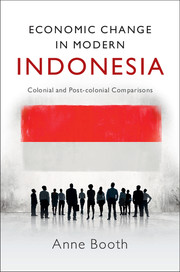Book contents
- Frontmatter
- Contents
- List of tables
- Acknowledgements
- 1 Introduction: Indonesia's three watersheds
- 2 The colonial legacy
- 3 Occupation, liberation and the challenges facing the new republic, 1942–66
- 4 Suharto's economic record: successes and failures
- 5 The 1997–98 crisis and its legacy: dropping out again?
- 6 The SBY years: building a new Indonesia?
- 7 Economic nationalism, economic rationalism and the development of private business after 1950
- 8 Trends in poverty and income distribution: the Suharto era and beyond
- 9 The changing role of government from the colonial era to the post-Suharto years
- 10 Conclusions
- Bibliography
- Index
6 - The SBY years: building a new Indonesia?
Published online by Cambridge University Press: 05 February 2016
- Frontmatter
- Contents
- List of tables
- Acknowledgements
- 1 Introduction: Indonesia's three watersheds
- 2 The colonial legacy
- 3 Occupation, liberation and the challenges facing the new republic, 1942–66
- 4 Suharto's economic record: successes and failures
- 5 The 1997–98 crisis and its legacy: dropping out again?
- 6 The SBY years: building a new Indonesia?
- 7 Economic nationalism, economic rationalism and the development of private business after 1950
- 8 Trends in poverty and income distribution: the Suharto era and beyond
- 9 The changing role of government from the colonial era to the post-Suharto years
- 10 Conclusions
- Bibliography
- Index
Summary
Promise of a new dawn
The disenchantment which many Indonesians felt with the reform process, and with the leadership of President Megawati Soekarnoputri, was reflected in the results of the parliamentary elections held in April 2004. The political party which emerged with the largest number of votes, 21.6 per cent of the total, was Golkar, which had dominated the political scene through the Suharto years. The Indonesian Democratic Party of Struggle (PDIP), the party of Megawati, managed to come second with 18.6 per cent of the votes, but this was a sharp decline from 1999 when the party gained one-third of the total vote. The remaining votes were spread among a number of parties, some of them Islamic in orientation and some secular (Marks 2004: 152). These results reflected growing frustration on the part of many Indonesians with the slow economic recovery since the crisis of 1997/1998, and a nostalgia for the greater economic progress during the Suharto years.
The presidential election which was held in July 2004 marked a historic shift away from the past practice of indirect presidential elections through an augmented parliament, the Peoples’ Representative Council (MPR). For the first time, Indonesia would have a directly elected president and vice-president. The strongest ticket was widely considered to be that of Susilo Bambang Yudhoyono (SBY), a retired general and former cabinet minister under Megawati, and Jusuf Kalla, a businessman from South Sulawesi and member of Golkar. SBY had come up through the military under Suharto; he had graduated from the Magelang Officers’ Academy in the 1970s and had also studied in the USA. He was widely considered to represent the moderate, secular wing of the armed forces, which had opposed the spread of Islamic views in the military in the last years of the Suharto regime. Fluent in English and well travelled (he had commanded the Indonesian contingent to the UN Peacekeeping Force in Bosnia in the 1990s), he presented himself with considerable success as a ‘thinking general’, who was well informed about world events and also capable of implementing much-needed reforms at home. Even while he was a cabinet minister, he had continued to study economics at the Bogor Agricultural University, and had set up his own think tank (the Brighten Institute) to advise him on policy issues.
- Type
- Chapter
- Information
- Economic Change in Modern IndonesiaColonial and Post-colonial Comparisons, pp. 106 - 129Publisher: Cambridge University PressPrint publication year: 2016

